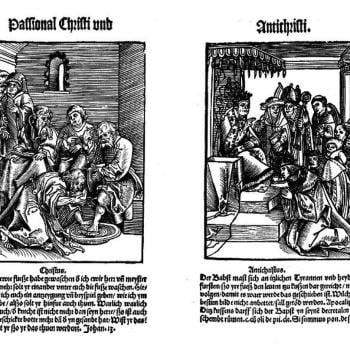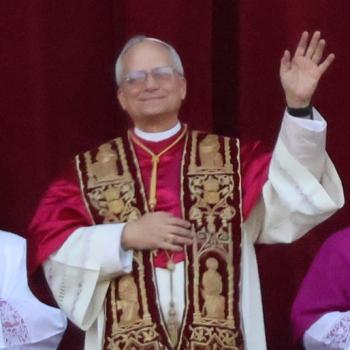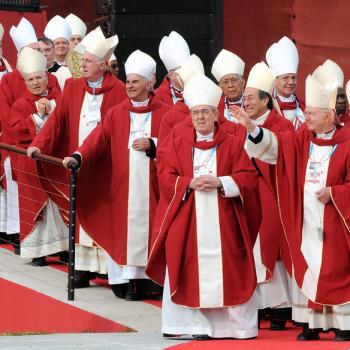With the Festival of the Reformation and the Feast of All Saints now in the rear view mirror of the Church Year, our thoughts are turned these last three Sundays to the end times, the return of Christ, the last days, judgment day . . . or, to use the fancy theological word for it: eschatology. Our Church Year takes us from the expectation and promises of a Messiah in Advent, to the days of His birth at Christmas, to the revealing of His divinity in Epiphany, to His suffering and death in Lent, the joy of the resurrection in the Easter season, the sending of the Holy Spirit at Pentecost, and that same Spirit working now in the life of the Church through the Pentecost season. But now we are at the end, and we look forward to the end, and the return of our Saviour to raise the dead and take us, all who believe and are baptized into in Christ Jesus (Mk 16:16), home. To the rest and pure joy of heaven.
And so (you may be thinking) that focus must start next week, because this week we didn’t hear end times or eschatology readings – we heard about a widow and her two mites in the Holy Gospel. . . .
And so, it seems to me, there is more to this reading than meets the eye. Something more than just about how much she – and we – put into the offering box or the offering plate. It’s about eschatology. It’s about how we live this life with a view toward the end. For, we believe, ever since Jesus’ death, resurrection, and ascension, we are living in the end times, the last days. Once Jesus ascended, He could return at any time, and we don’t know when. So how do we live in these days, these last days? It’s good to take stock of that and consider.
And there are two examples presented to us today: the scribes and the widow. Of the scribes, Jesus says, beware. Beware not (this time) of their teaching, but of how they are living. For their lives are all about the here and now. What honor they receive now, what glory is bestowed now, what advantages they get now. There seems to be no mercy or compassion in them, for they even devour widows’ houses. And their religion is a scam too, Jesus says. Their long prayers are a pretense – something they do to look holy, while going after the things of this world. . . .
But then there is the widow. How utterly different is she. For her the here and now is a hardship. Unlike the scribes, there is no honor for her now, no glory for her now, no advantages for her now. Maybe she still had her house because she was so poor and her house so humble that it wasn’t worth the scribes’ effort to devour it! And yet what little she had, those two small copper coins, she doesn’t keep, she doesn’t spend on food, she doesn’t hold on to for future needs – she drops them into the Temple treasury. They didn’t really make a difference. Her offering was like dumping a glass of water into the ocean. Or (to use my fiscal cliff example) like me sending in a dollar to the US Treasury – it’s not really going to make a difference in paying down the national debt!
But that’s not why she did it. She gave those two coins because she was living with a fundamentally different outlook than the scribes. Her “here and now” wasn’t even worth two small copper coins; but her future was. She did what she did because she was living her life with a view toward the end. Others may laugh at her for putting in so little, they might come and devour her house next, she might not have food the next day or the next week. But her life wasn’t in these things. These things were not her utmost concern. For, Jesus said, she put in everything she had, all her life. That’s what it really says: all her life. She put her life into the Temple that day; into the place where God dwells.
As I was thinking about this text, I tried to imagine this widow and what she did. At first, I wondered if she hesitated – even just for a second – before letting go of those two coins. Maybe, maybe just give one – that would still be 50%! Far more than the others. . . . But then, I thought, no. This probably wasn’t even the first time she did it. It was just the first time somebody noticed. This was perhaps her regular practice. No hesitation at all. Because when you don’t live for the here and now, it’s easy to let go of the here and now. You don’t give out of obligation, like those who put in exactly 10% (and not a penny more!) out of their abundance because they had to, because it was the Law. You give because you’re not looking at the Law, you’re not thinking about your obligation, you’re not worried about your life – for your life is not in the here and now, but in heaven, in God, in the promise of the Messiah who would provide life now and life forever. That’s what the eyes of faith look at.
And little did that widow know who was looking at her! Little did that widow know that Messiah was sitting right there in the Temple that day looking at her. And what she did in faith reminded Him of what He was now about to do. That’s why Jesus says she put in her life – not just “all she had to live on,” as our translation said – but her life. That’s what Jesus saw because that’s what Jesus was now about to do: give His life. Lay it down on the altar of the cross. Fill the treasury of heaven not with gold or silver, but with the forgiveness earned by His holy precious blood and His innocent suffering and death. To (as we heard in the verses from Hebrews today) put away sin by the sacrifice of himself. Which means that this widow is not first and foremost an example for us, but an example of what Jesus was now going to do for us.
via St. Athanasius Lutheran Church: Pentecost 24 Sermon.
















